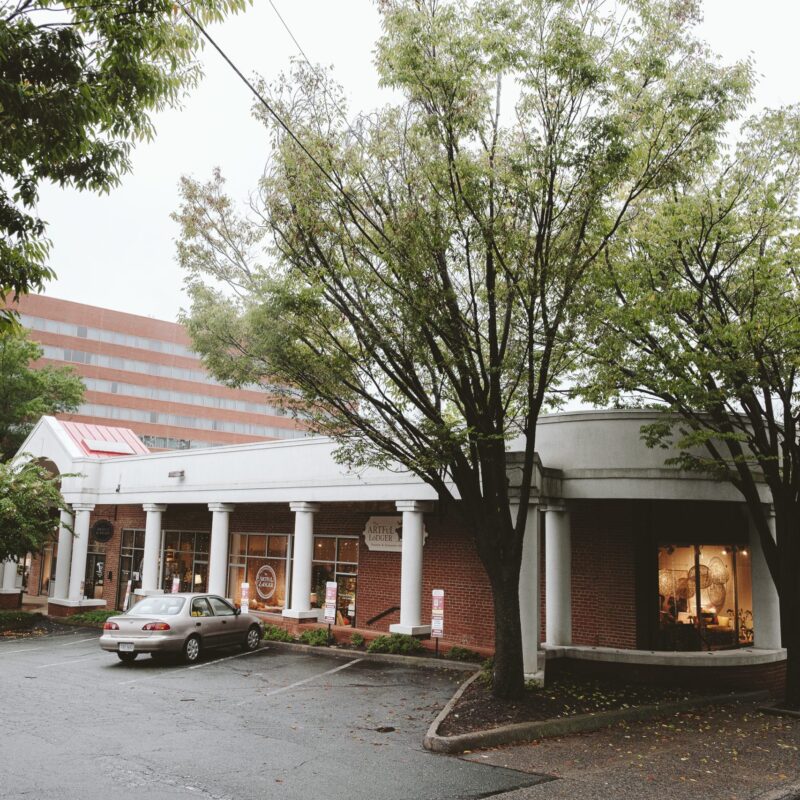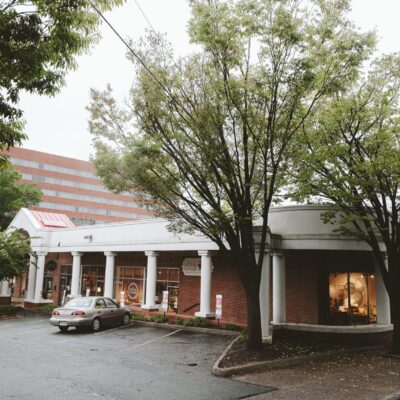A few short years ago, just about any site in the Charlottesville area seemed viable for redevelopment, whether it was currently occupied by 100-year-old houses, a historic church or public housing. Banks were lending, money was flowing, and everybody’s cousin had a development idea within reach.
Welcome to 2009. In a climate like this, when the federal government has to pour cash into banks just to keep them afloat, suddenly only a handful of those ideas seem compelling enough to risk. Locally, rumors swirl about the viability of every nine-story building (see last week’s Landmark Hotel coverage on c-ville.com).
|
The Martha Jefferson Hospital site is one of the few noteworthy local projects likely to go through rezoning this year. Three developers are vying for the chance to do so, according to hospital officials. |
“Clearly right now, the financial markets are in a deep freeze,” says Ivo Romenesko with Appraisal Group Inc. But he points out one benefit to such market doldrums—now’s a great time to push through government red tape: “It often takes two to three years to get planning, engineering and approvals done. By the time you get that done, the market will have turned around.”
|
PREVIOUS COVERAGE OF MARTHA JEFFERSON’S MOVE Hospital slims list of redevelopment partners Students imagine MaJeff in 2018 Martha Jefferson releases demand analysis Hospital starts hunt for redeveloper Neighbors look to protect hospital houses Docs eye future migration Martha Jefferson looks to 2012 |
Two complex redevelopment sites stand out as worth watching in 2009 because of their potential to dramatically alter the landscape of their respective neighborhoods: Martha Jefferson Hospital’s 14 acres in Downtown Charlottesville and the 20 acre Barnes Lumber Company in downtown Crozet.
The campus of Martha Jefferson hospital, nestled between the bustle of Downtown and the quiet of a residential neighborhood, presents prime land for redevelopment in the city.
But it’s complicated. The primary hospital building, built as a functional medical building, would be difficult to convert into anything else and may need to come down, yet several other structures on the site are up for historic designation. To rezone the property, a new developer must work with both the city and neighbors who are very interested in protecting their property values.
Despite the difficulty, the hospital, which is depending on the sale of the site to help pay for its new Pantops facility, has been working hard to address those complications, and now, according to spokesman Steve Bowers, the hospital is evaluating three redevelopment partners.
“We have gone to great lengths to tell them what we’ve heard from the neighbors and from the city, and all three of these companies have reflected what we’ve told them in their proposals,” says Bowers. “I think that’s been very reassuring for our neighbors. No one’s planning on any skyscrapers.”
The hospital won’t completely move out to Pantops until 2012, but because of the challenges, Martha Jefferson had intended to have a development partner in place by the end of 2008. Bowers now hopes to get a recommendation to the hospital board by March.
“It’s taking a little bit longer than we expected, basically because we’re erring on the side of prudence and patience,” says Bowers. He won’t name the finalists, but says “there are local, regional and national players still in the mix” and that they all have “conservative, but still visionary, approaches with what to do with the project.”
“Like we’ve said from day one,” Bowers says, “no matter how great the drawings are, and how great the dreams are, if this project doesn’t come to fruition and start soon after we move to the new hospital, then that’s not success in our eyes.”
While the Martha Jefferson move has been in the works since 2002, a site just hit the market that could expand downtown Crozet to the east and tip the balance to create the kind of town that officials have dreamed of.
Carroll Conley owns the Barnes Lumber Company, which has about 20 acres of land along Route 240 assessed at $3 million. He’s offering to sell between 6.5 and 10 acres of vacant land, according to the Crozet Gazette’s January edition, and told the paper he’d consider selling the entire property: “I’d listen to anything.” Conley declined a request for an interview with C-VILLE, but according to the Gazette, his decision to sell comes on the heels of laying off nine employees out of about 50.
The county certainly has a strong vision of what his property, zoned heavy industrial, could become. During work sessions on a county-initiated rezoning of downtown Crozet, county staff talked of a redeveloped lumberyard as a new main street that would connect with The Square.
But Conley asked that his 20 acres be withdrawn from the rezoning, even though it was in the original proposal drawn up by consultants.
“If the lumberyard was ever sold to a developer, then the county would have the right to ask for some proffers, which I think is very reasonable,” he said to the Board of Supervisors in June. Now, unless the property is bought by another business with heavy industrial plans, a developer will have to rezone and pony up proffer money for roads, schools and other infrastructure improvements—a cost likely borne both by the buyer and the seller.
When Bowers gave a presentation to Martha Jefferson neighbors and city leaders in February, he managed to put a positive spin on the faltering economy: “It’s better knowing you have a bad economy than riding a high economy and picking whatever partner looks good, because they’re going to have to prove themselves vis-à-vis the elephants of the day.”
That was back during the relatively sunny days before the global credit crunch and a full-blown recession. Does he still believe that the dismal state of the market is a good thing for Martha Jefferson redevelopment?
Yes: “We really want to make sure whoever we partner up with has the capacity to get it done and it’ll be a priority for them immediately once we can get a partnership established.” As an example, Bowers says one publicly traded company was in the mix as a partner, but its stock was hit hard by the financial crisis this fall and it dropped from the running. “It paid off that our process was so patient.”
But he also admits that the hospital is considering being even more patient.
“To be honest, something that the finalists have to contend with is the question that a lot of smart people are asking, which is why don’t we just wait and let the economy catch back up and let the market rematerialize,” says Bowers. “Now’s a really great time, and obviously we don’t want to lose the momentum that we have with the neighborhood and the city regarding the vision for the project, but at the end of the day, we still have to consider, is now the right time?”
C-VILLE welcomes news tips from readers. Send them to news@c-ville.com.






